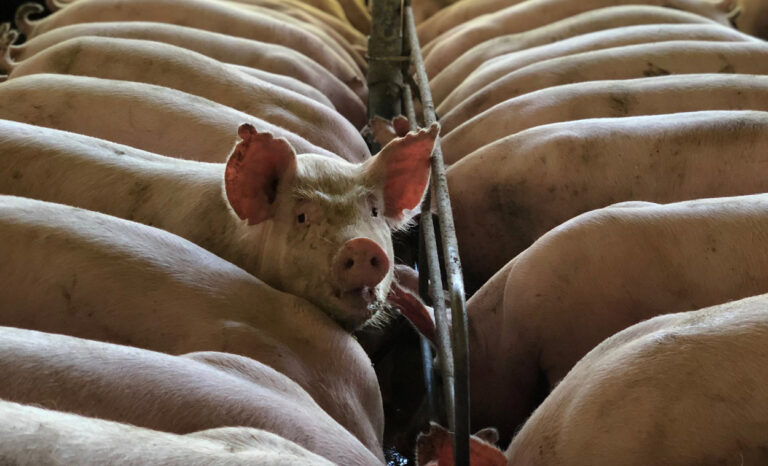Facial recognition technology for farm animals could help make tastier meat
People truly care about the wellbeing of the animals that end up on their plate. Actually, let me correct that and say it like it is: they only care about animal welfare because happy and healthy livestock make for tastier meat, duh.
And it looks like things are only kicking off in the meat processing business. In yet another facial recognition technology feat—one that, for once, will probably please most people (or carnivores, at least)—we’ll soon be able to screen the faces of farm animals in order to properly ‘care’ for them.
In other words, ear tags will make way for biometric passports, and all this in the name of better-tasting meat. Here’s exactly how the technology will work and how it could change the meat industry.
From border checkpoints to barns
Imagine that you’ve just landed in a foreign country after a long flight—I’m talking double digits long. You’re exhausted and sore from sitting for literal hours in an economy seat squished between two strangers. Your hair is greasy and your skin as dry as a bone. As you rush out of the plane like the rest of the other passengers—no one really knows exactly why they hurry, they just do—you think to yourself, “Almost there.”
Only one obstacle remains in your way: the border checkpoint. But hey, no stress, you’re among the lucky ones because you’ve got a biometric passport, meaning that instead of having to queue longer and interact with a real person, you can simply swipe your top-tier travel document, stay put for a quick piccie and an obligatory face scan and you’re all done—already on your way to grab your suitcase and get the heck out of that awful place.
Now, try to think of a similar situation, but instead of humans travelling around the world for leisure, picture cows and pigs unknowingly spending their whole life waiting for their unavoidable slaughter. This is where this new tech comes in.
Pigs—along with other popular meat options like cows, poultry and lambs—would be issued with biometric passports based on facial recognition technology, giving farmers a more practical and welfare-friendly way of identifying animals than ear notches, aka the current industry standards.
Identifying pigs based on their unique facial features could in turn enable them to receive individualised food and veterinary care, and be traced as they go through meat processing. With the help of advanced algorithms and machine learning, we’d be able to distinguish between the faces of even the most similar-looking animals.
Furthermore, this type of assessment could be conducted from afar, without humans having to interfere in the non-domesticated livestock’s lives—going as far as to pick on visual cues such as tension in an animal’s neck, the shape of its eyes, nose bunching and ear placement.
And, as first noted by Food Navigator, even signs as small as the ones listed above could help farmers get a clear understanding of their animals’ welfare, “If the white of a pig’s eye is showing, it may indicate aggression. When a pig’s ears are pinned back against its head, it may indicate a negative emotion or aversion,” the publication explained.
If the idea of happier farm animals and therefore better quality meat has already got you sold and salivating, don’t get too excited just yet, as there might be a catch—higher animal welfare standards resulting in tastier products would undoubtedly come with a higher price tag.
Does humanely raised meat actually taste better?
Up until this point, I went along with the whole narrative that meat coming from a more humane or ‘cage-free’ source always means better quality. But is this actually the case or are we just prone to believe so for obvious moral reasons? After all, doesn’t wine tend to taste better when you believe it to be more expensive than your usual corner shop go-to bottle?
Well, researchers Eric Anderson of Tufts University and Lisa Feldman Barrett of Northeastern University once faced the same question and took it upon themselves to investigate it for a paper published in the peer-reviewed journal PLOS One back in 2016.
“People believe they experience the world objectively, but research continually demonstrates that beliefs influence perception,” the team wrote in the paper’s abstract. “Our goal was to test whether beliefs about how animals were raised (whether they suffered) would influence the experience of eating meat,” they continued in the introduction.
To do so, Anderson and Feldman Barrett conducted three studies in which they had college students sample jerky and roast beef presented to them in packaging that had been tampered with by the researchers in order to include different animal welfare labels than their original ones.
“People were led to believe one sample was raised on a ‘factory farm’ (negative belief) while the other was ‘humanely raised’ (positive belief).” Each participant was exposed to both labels in randomised order, yet two identical samples were prepared and given to them.
Participants then had to rate the two pieces of meat’s look, smell and taste. And surprise, surprise—even though the students often didn’t differentiate between the control and humane conditions, they often gave the meat a “penalty” in terms of smell, taste and “pleasantness” after they were told it came from a factory farm.
In other words, although Anderson and Feldman Barrett’s results didn’t prove that animals treated in less humane ways than others don’t taste as good, their research did highlight the fact that there isn’t such a thing as ‘objective’ perception when it comes to food, and more.






